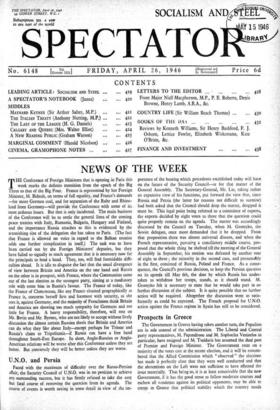U.N.O. and Persia
Faced with the maximum of difficulty over the Russo-Persian affair, the Security Council of U.N.O. was in no position to achieve any outstanding success, but it has firmly refused to take the easy but fatal course of removing the question from its agenda. The course of events is worth noting in some detail in view of the im-
portance of the bearing which precedents established today will have on the future of the Security Council—or for that matter of the General Assembly. The Secretary-General, Mr. Lie, taking rather an expansive view of his functions, put forward the view that, since Russia and Persia (the latter for reasons not difficult to surmise) had both asked that the Council should drop the matter, dropped it must be. This legal point being referred to a committee of experts, the experts decided by eight votes to three that the question could quite properly remain on the agenda. The matter was accordingly discussed by the Council on Tuesday, when M. Gromyko, the Soviet delegate, once more demanded that it be dropped. From that proposition there was almost universal dissent, and when the French representative, pursuing a conciliatory middle course, pro- posed that the whole thing be shelved till the meeting of the General Assembly in September, his motion was defeated by another vote of eight to three ; the minority in the second case, and presumably in the first, consisted of Russia, Poland and France. As a conse- quence, the Council's previous decision, to keep the Persian question on its agenda till May 6th, the date by which Russia has under- taken to withdraw her troops, stands, as it should stand. M. Gromyko felt it necessary to state that he would take part in no further discussion of the subject. It is quite possible that no further action will be required. Altogether the discussion went as satis- factorily as could be expected. The French proposal for U.N.O. action against the Franco regime in Spain has still to be considered.


























